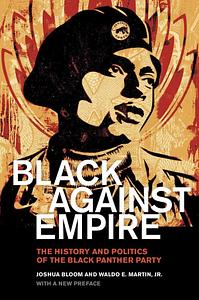Take a photo of a barcode or cover
163 reviews for:
Black against Empire: The History and Politics of the Black Panther Party
Joshua Bloom
163 reviews for:
Black against Empire: The History and Politics of the Black Panther Party
Joshua Bloom
This is an excellent history of the Black Panthers as a counter-culture, radical anti-imperialist movement. However, it tends to move back and forth in time which gets a little disorientating.
challenging
dark
emotional
informative
inspiring
reflective
sad
tense
slow-paced
challenging
informative
medium-paced
really interesting and in depth in most parts but some sections felt glossed over like the newton/seale split towards the end
I really learned a lot from this book. I have always admired the revolutionary history of my people. This is a well researched and fair history of the the political perspective of the Black Panther Party. They were an organization of its time. They were not a static organization and changed tactics based on the conditions of the time. The state repressions used against American citizens who advocated for black Americans be treated like human beings still resonates today and can be applied to other marginalized communities. They also strongly advocated self-defense.
I was impressed that the authors' of this book did not demonize the Panther's Marxist's perspective. I plan to read many of the works that the Panther's cited as guides for their political and economic perspective. If one is looking for a book that does not portray the Party as just a group of violent insurgents that hated non blacks; I would highly recommend this book. I would have liked to see a bit more on the evolution of Eldridge Cleaver's thought which led him to the Black Liberation Army, but I accept that was probably slightly beyond the intended scope of the book. I look forward to reading more books by these authors.
I was impressed that the authors' of this book did not demonize the Panther's Marxist's perspective. I plan to read many of the works that the Panther's cited as guides for their political and economic perspective. If one is looking for a book that does not portray the Party as just a group of violent insurgents that hated non blacks; I would highly recommend this book. I would have liked to see a bit more on the evolution of Eldridge Cleaver's thought which led him to the Black Liberation Army, but I accept that was probably slightly beyond the intended scope of the book. I look forward to reading more books by these authors.
challenging
informative
inspiring
reflective
slow-paced
challenging
emotional
informative
reflective
medium-paced
Very interesting book about a political movement people seem to believe they know more about than they ever actually do. Bloom's history really gets into the personalities and pressures that caused the Black Panther Party to begin, to flourish, and, ultimately, why it gradually dissolved.
The most interesting aspect to me is that final one. Having a radical movement gain momentum caused it to try to live in two worlds at once. It needed the fiery fury on the ground to swell the grassroots momentum, but then it began to rely on wealthy white liberals for funding, leading a serious internal conflict that it could not overcome. It needed to be both respectable and radical, which is an unwalkable tightrope.
On top of that, the immense state pressure applied to it led these conflicts and contradictions to become fissures that cracked the party apart.
While the book begins with personalities, it gradually moves away from individuals, which is a bit of an issue, I think. It makes the second half of the book feel more abstract to the point that some of the shifts and turns in the Party become a bit hazy, with regard to motivations.
Still, a very useful primer on the history of the Black Panthers.
The most interesting aspect to me is that final one. Having a radical movement gain momentum caused it to try to live in two worlds at once. It needed the fiery fury on the ground to swell the grassroots momentum, but then it began to rely on wealthy white liberals for funding, leading a serious internal conflict that it could not overcome. It needed to be both respectable and radical, which is an unwalkable tightrope.
On top of that, the immense state pressure applied to it led these conflicts and contradictions to become fissures that cracked the party apart.
While the book begins with personalities, it gradually moves away from individuals, which is a bit of an issue, I think. It makes the second half of the book feel more abstract to the point that some of the shifts and turns in the Party become a bit hazy, with regard to motivations.
Still, a very useful primer on the history of the Black Panthers.
informative
reflective
medium-paced
Oh what could have been
I made it a little past halfway through the audiobook and had to stop. The book is extraordinarily well done and I think it should be required reading in white schools.
After my own experience with police knowingly allowing child sexual abuse in my childhood parish, after having been raised with the knowledge of police brutality in the Chicago 1968 DNC (I was born in '85), after police torture in Chicago, and after working just a couple blocks away from police shooting unarmed protesters in Austin TX I had to stop reading this book. The book's descriptions of police brutality in 1969 were so familiar that I kept having flashbacks after putting the book down. This says a lot about just how little white America has changed over the past 50+ years.
Having already studied AIM (American Indian Movement), Stonewall, and the Lavender Menace I really appreciated how this book explains the development of anti-imperialism activism in the US. Of course all these movements happened at the same time!
After my own experience with police knowingly allowing child sexual abuse in my childhood parish, after having been raised with the knowledge of police brutality in the Chicago 1968 DNC (I was born in '85), after police torture in Chicago, and after working just a couple blocks away from police shooting unarmed protesters in Austin TX I had to stop reading this book. The book's descriptions of police brutality in 1969 were so familiar that I kept having flashbacks after putting the book down. This says a lot about just how little white America has changed over the past 50+ years.
Having already studied AIM (American Indian Movement), Stonewall, and the Lavender Menace I really appreciated how this book explains the development of anti-imperialism activism in the US. Of course all these movements happened at the same time!





